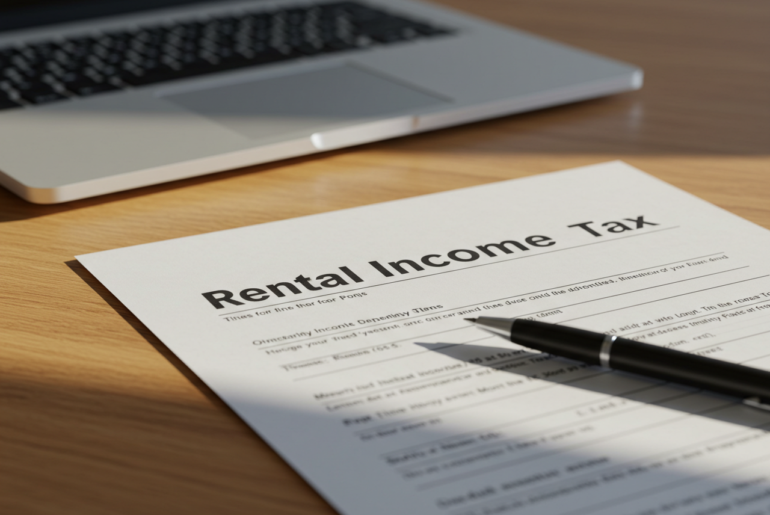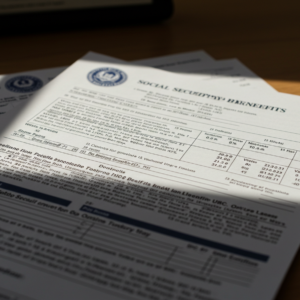This article may contain references to products or services from one or more of our advertisers or partners. We may receive compensation when you click on links to those products or services. Nonetheless, our opinions are our own.
The information presented in this article is accurate to the best of our knowledge at the time of publication. However, information is subject to change, and no guarantees are made about the continued accuracy or completeness of this content after its publication date.

Updated by Albert Fang
As a Canadian property owner, managing rental income and taxes can be complicated, especially with frequent regulatory changes. 2025 brings notable updates that could affect your financial landscape. Whether you’re an experienced landlord or just entering the rental market, staying informed is crucial. We’ll break down the latest tax developments specific to rental income, providing clear, factual insights to help you plan effectively and meet your obligations. Understanding these changes can make all the difference, ensuring you maximize your income while minimizing complications come tax season. Let’s explore what you need to know for the year ahead.
Understanding the New Tax Regulations for Rental Income in 2025
As a Canadian property owner, you’ll want to familiarize yourself with the updated tax regulations that come into play in 2025. These changes can significantly impact how you report and manage your rental income, ensuring you stay compliant while optimizing your financial outcomes. Here are a few key adjustments to take note of:
- New Reporting Thresholds: The minimum annual rental income must be reported has increased, which means if your rental business is more modest, you might enjoy some leniency in filing.
- Expanded Deductions: You can now claim more expenses as deductions. Keep track of all operational costs, including repairs, maintenance, and even some improvements that add value.
- Tax Credits for Energy Efficiency: If you make eco-friendly upgrades to your rental property, new tax credits will help reduce your taxable income, so investing in sustainability might pay off in more ways than one.
To keep everything organized, consider creating a simple table for your records. Here’s a refresher for tracking your deductible expenses:
| Type of Expense | Eligible for Deduction? | Notes |
|---|---|---|
| Repairs | Yes | Routine maintenance counts. |
| Improvements | Subject to specific criteria | Some upgrades qualify, check specifics. |
| Utilities | Yes | Claim only for rental periods. |
With these insights, you can confidently approach your rental income, ensuring you’re maximizing your potential tax benefits while remaining compliant with the latest regulations.
Tips for Maximizing Tax Deductions on Your Rental Properties
Maximizing your tax deductions on rental properties can significantly affect your bottom line. Here are some personal strategies that could help you capture every possible deduction:
- Track All Expenses: Stay organized by logging all property-related expenses, including repairs, maintenance, property management fees, and advertising costs. You might be surprised at how these add up.
- Depreciation Deduction: Don’t overlook this essential deduction. You can depreciate the value of your property over time, which can lead to substantial tax savings.
- Consider Capital Improvements: If you make significant upgrades to your property, like a new roof or a renovation, you may be able to deduct these expenses as capital improvements, enhancing your overall deduction profile.
| Expense Type | Deductible (Yes/No) | Notes |
|---|---|---|
| Property Taxes | Yes | Fully deductible for the year paid. |
| Mortgage Interest | Yes | Higher interest rates can lead to significant deductions. |
| Personal Use Days | No | Renting properties that you also use can affect deductions. |
Lastly, explore all available tax credits for energy-efficient upgrades or renovations. These can lead to immediate financial benefits and align your investments with lasting practices. If you’re based in Quebec, consider speaking with SR&ED credits tax consultants in Quebec to better understand how innovation-related incentives might apply to your property upgrades.
As a Canadian landlord, understanding the adjustments in capital gains tax is crucial for ensuring you’re on the right side of the law and maximizing your returns. In 2025, the federal government has introduced a few key changes you need to be aware of. For starters, the exemption threshold for capital gains has increased, allowing you to keep more profits when selling your rental properties. However, with this increase, you must report your sales and purchases accurately to avoid any pitfalls.
It’s vital to be mindful of the changes in how the tax is calculated. Unlike previous years, the CRA will now require a more detailed breakdown of expenses and improvements made to rental properties over time. This means keeping diligent records of all renovations and repairs. Here’s a quick overview of the factors influencing your capital gains calculations:
| Factor | Description |
|---|---|
| Sale Price | The amount for which you sell the property. |
| Adjusted Cost Base | The original purchase price plus any allowable expenses. |
| Improvements | Eligible renovations can increase your Adjusted Cost Base. |
| Holding Period | The length of time you own the property may impact tax rates. |
Staying updated on these changes is not just about compliance; it’s about leveraging the benefits to enhance your financial portfolio. By anticipating these tax implications, you can make informed decisions about your rental property investments, ensuring you’re not just getting by but thriving as a landlord.
Unpacking the Implications of Short-Term Rental Income on Your Taxes
Diving into the world of short-term rental income can be exciting, but it also brings with it a wave of tax implications you’ll need to navigate. In 2025, Canadian property owners will grapple with new regulations requiring a more comprehensive reporting of rental income. It’s essential to categorize your income correctly to avoid pitfalls with the Canada Revenue Agency (CRA). Here’s what you should keep in mind:
- Declare All Income: Every dollar earned from short-term rentals must be reported regardless of how long a guest stays. Even if you’re using rental platforms that deduct fees, your income reporting should include the full amount you receive.
- Eligible Deductions: You can reduce your taxable income by claiming expenses related to your rental activities. This includes advertising fees, cleaning and maintenance expenses, while keeping proper receipts to support your claims.
- GST/HST Considerations: As of 2025, you may need to register for GST/HST if you earn over a certain threshold. Make sure to check the specific limits and guidelines to ensure compliance.
Tracking the days your property is rented out versus personal use is vital. If your rental use surpasses personal use, you may need to look into the implications of capital gains tax when selling the property. Understanding these nuances can save you from unexpected tax bills, making it crucial to stay updated with any changes and consult with a tax professional if needed.
| Income Source | Tax Status |
|---|---|
| Less than 14 nights | Typically not taxable |
| 14 nights or more | Fully taxable |
| Mixed Use | Pro-rated based on rental vs. personal use |
Strategies for Staying Compliant and Avoiding Common Tax Pitfalls
Staying compliant with tax regulations while maximizing your rental income requires a proactive approach. Here are some strategies to help you steer clear of common tax pitfalls:
- Keep Meticulous Records: Document every transaction related to your rental property, including expenses, repairs, and income. This will simplify your reporting process and provide a clear audit trail if needed.
- Understand Deductible Expenses: Familiarize yourself with what can be deducted to reduce your taxable income. Standard deductions include maintenance costs, property management fees, and mortgage interest.
- Use a Qualified Accountant: Consider enlisting a tax professional specializing in rental properties. Their expertise can help you navigate complexities and benefit from all available tax breaks.
- Stay Updated: Tax laws can change, so regularly check for updates that may affect your situation. Subscribing to tax newsletters or following tax authorities on social media can keep you in the loop.
Below is a quick reference for standard rental income tax deductions:
| Expense Category | Deduction Type |
|---|---|
| Repairs and Maintenance | 100% deductible in the year incurred |
| Property Management Fees | 100% deductible |
| Mortgage Interest | 100% deductible |
| Utilities | 100% deductible if paid by you |
By implementing these strategies, you’ll stay compliant and cultivate a more successful rental property venture. Remember, the goal is to make informed decisions that benefit your financial future while enjoying the property management process.
Planning for Future Tax Reforms: What Every Property Owner Should Consider
As a property owner, staying informed about upcoming tax reforms is crucial for effective financial planning. In 2025, you might face adjustments in tax policies affecting your rental income. Here are some key considerations to keep in mind:
- Tax Deductions: Familiarize yourself with which expenses can still be deducted. Repairs, maintenance, and specific operational costs will likely remain deductible, but it’s essential to verify changes in tax regulations.
- Capital Gains and Losses: Changes may impact how you report capital gains or losses when selling a property. Understanding these implications will help you make informed decisions on buying or selling assets.
- Tax Credits: Look out for new tax credits being introduced for property owners, especially those related to energy efficiency upgrades or affordable housing initiatives.
| Item | 2024 Advantage | 2025 Consideration |
|---|---|---|
| Rental Income | Traditional income reporting | Potential higher tax rates |
| Deductions | Standard deductions available | Possible limits on specific expenses |
| Credits | Tax credits for renovations | New environmental credits may emerge |
By staying proactive and informed, you can navigate these changes effectively. Taking legal advice or consulting a tax professional can also provide tailored strategies to minimize tax liabilities and maximize your investment potential.
Voted "Best Overall Budgeting App" by Forbes and WSJ
Monarch Money helps you budget, track spending, set goals, and plan your financial future—all in one app.
Get 50% OFF your first year with code MONARCHVIP
Conclusion
As a Canadian property owner, staying on top of the latest tax regulations and changes is essential for effectively managing your rental income. With 2025 bringing key updates, it’s crucial to understand new reporting requirements, deductions, and the implications of capital gains tax. You can optimize your financial outcomes by keeping thorough records, leveraging eligible tax credits, and considering energy-efficient investments while ensuring compliance with Canadian tax laws.
Whether you’re managing a long-term rental property or diving into the short-term rental market, these strategies will help you navigate the complexities of the tax landscape. Remember, seeking guidance from a tax professional and staying informed about future reforms will ensure your rental income remains a strong and sustainable asset. By planning ahead, you’ll be well-equipped to maximize your returns and minimize tax liabilities, setting yourself up for continued success in real estate investing.
Frequently Asked Questions
What are the recent changes in rental income taxation for Canadian property owners in 2025?
In 2025, Canadian property owners will see adjustments in rental income taxation, including changes to allowable expense deductions and new reporting requirements aimed at increasing transparency and simplifying the filing process.
How do the new regulations impact expense deductions?
The updated regulations now provide more straightforward guidelines on what expenses can be deducted against rental income. Property owners can expect more defined categories for expenses like maintenance, repairs, and property management fees.
Are there new reporting requirements I should be aware of?
Yes, starting in 2025, property owners must report rental income and related expenses separately in their tax returns. Maintaining detailed records and receipts to substantiate claims will be more crucial than ever.

Reviewed and edited by Albert Fang.
See a typo or want to suggest an edit/revision to the content? Use the contact us form to provide feedback.
At FangWallet, we value editorial integrity and open collaboration in curating quality content for readers to enjoy. Much appreciated for the assist.
Did you like our article and find it insightful? We encourage sharing the article link with family and friends to benefit as well - better yet, sharing on social media. Thank you for the support! 🍉
Article Title: 2025 Rental Income Tax Changes Every Canadian Property Owner Needs to Know
https://fangwallet.com/2025/04/15/rental-income-tax/The FangWallet Promise
FangWallet is an editorially independent resource - founded on breaking down challenging financial concepts for anyone to understand since 2014. While we adhere to editorial integrity, note that this post may contain references to products from our partners.
The FangWallet promise is always to have your best interest in mind and be transparent and honest about the financial picture.
Become an Insider

Subscribe to get a free daily budget planner printable to help get your money on track!
Make passive money the right way. No spam.
Editorial Disclaimer: The editorial content on this page is not provided by any of the companies mentioned. The opinions expressed here are the author's alone.
The content of this website is for informational purposes only and does not represent investment advice, or an offer or solicitation to buy or sell any security, investment, or product. Investors are encouraged to do their own due diligence, and, if necessary, consult professional advising before making any investment decisions. Investing involves a high degree of risk, and financial losses may occur including the potential loss of principal.
Source Citation References:
+ Inspo
There are no additional citations or references to note for this article at this time.












































